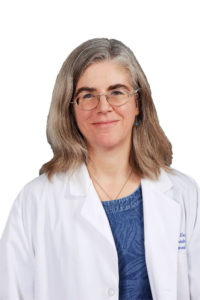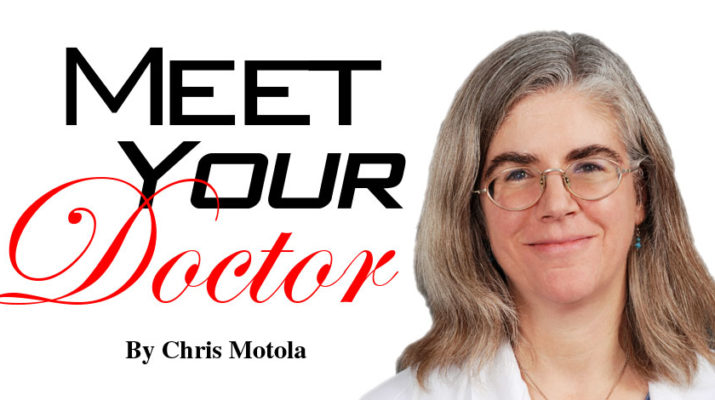Highland Hospital geriatrician a big proponent of plant-based diet. She explains why
By Chris Motola

Q: In addition to being a geriatrician, you’re a big advocate for lifestyle changes. How do those two factors inform each other?
A: I’ve been a geriatrician now for about a quarter of a century. I’ve been a geriatric hospitalist for 20 years here at Highland Hospital. What geriatricians focus on are things like frailty and multiple chronic diseases and functional and cognitive impairment. When I started out, the patients I was seeing were 80, 90. A few years ago it struck me that I was seeing younger and younger patients with issues associated with older adults, specifically patients with multiple, chronic comorbidities. So I was seeing patients in their 50s, 40s, even their 30s with significant chronic illness.
Q: How do you view lifestyle issues with regard to health?
A: I’ve always been interested in systems and how they impact health outcomes. I started to think about what it was about our system that was leading to this. At the same time, as a geriatrician — there are only about 7,000 of us in the country — I’ve been thinking, how in the world are we going to take care of these people if they’re developing chronic illness in their 30s and 40s. What’s their life going to look like when they hit their 60s, 70s and 80s, and will they even live to that age? That was the rationale for starting to rethink what I was doing and try to figure out if there was a better way to do this. There’s a quote, “A system is perfectly designed to get the results it gets.” For me, that’s ominous, because the outcomes we’re getting are people with lots of chronic illness, and we’re paying over $3 trillion a year to get those outcomes. And what we’ve seen over the past three or four years is a decline in life expectancy. I think we really need to rethink what we’re doing if we really want to improve our outcomes.
Q: Before we touch on systems, what are the comorbidities you’re seeing?
A: Cardiovascular disease, diabetes is big and on the upswing. The estimate for kids born after 2000 is that one in three will develop diabetes. For minorities, that number goes to one in two. So it’s a huge increase in diabetes. Two-thirds of our population are overweight or obese. Hypertension, hyperlipidemia. These all become risk factors for other diseases. Now, a lot of these are addressable by lifestyle.
Q: Was there any turning point in your thinking?
A: I had the good fortune to run into Dr. Ted Barnett and his wife Carol. They’ve been teaching a course on plant-based nutrition for over eight years. It really flipped the switch for me to realize the incredible impact nutrition has on chronic health. He also introduced me to the American College of Lifestyle Medicine [ACLM]; the first lifestyle boards were given in 2017. And Rochester is actually kind of an epicenter of lifestyle medicine in large part due to Dr. Barnett. There have also been many of us who have followed in those footsteps and become more and more interested in lifestyle medicine. One of the intriguing things about the field of lifestyle medicine is it’s so diverse in terms of the specialists who come to it. So at an ACLM meeting you’ll get psychiatrists, pediatricians, surgeons, pretty much every field you can imagine, and I think that’s because we’re all coming to the conclusion that what we’re doing in our healthcare system isn’t really working. We need to fundamentally rethink our approach to health.
Q: So when I hear “system” in this context, I don’t just think of medicine. I think of food availability, work-life balance, access to healthy activities, economic incentives, community, fatigue, etc. To what degree can the medical industry even really make a dent in this unilaterally, without the cooperation of many other parts of society?
A: That’s an interesting question. In theory, that’s our realm; education, raising public awareness. But as you say, it’s a complex issue that involves lots of other realms. Things like our food system. Things like education, our living spaces, how our environments are set up — do they encourage walking, socializing and are they safe to move around in? So, all of those things certainly contribute to how successfully we can promote health. There are areas around the world called blue zones where people live to very old ages with high levels of health and function. There are some commonalities to them. One of them is a predominantly plant-based diet. Another is sustained physical activity. The third piece has a lot to do with connectedness and maintaining a sense of meaning and purpose.
Q: So mostly stuff we’re pretty bad at.
A: All things where the pressures have been in the wrong direction, definitely. Sleep is a biggie. The estimate is that two-thirds of the population are sleep-deprived. And that affects our health hugely. It impacts our cardiovascular health. It impacts our mood. It impacts our cognitive function. We have all these pressures to just be nonstop until we collapse, so the only time we can borrow from is sleep. We’re under pressure to go to bed later, get up earlier, so we can cram our days full of more stuff. It definitely has an impact on our lives.
Q: As far as plant-based diets, are we talking veganism?
A: I consider myself more plant-based. There’s an overlap, but veganism is more about what you leave out where plant-based is more what you try to include in your diet. People go vegan for many reasons, like the environment and concern for animals — which I support. But there are many junk food vegans, so you can eat vegan and not be healthy. So as a physician, I think it’s more important to focus on the four food groups of plant-based eating which are vegetables, fruits, whole grains and peas, bean and lentils and then small amounts of fats from things like nuts and avocado.
Lifelines
Name: Susan Marie Friedman, M.D., MPH
Position: Staff physician at Highland Hospital; professor of geriatric medicine at University of Rochester School of Medicine and Dentistry; she is also the medical director of Rochester Lifestyle Medicine Group and the director of clinical research for the Rochester Lifestyle Medicine Institute.
Hometown: Chicago
Education: Northwestern University
Affiliations: Highland Hospital; Rochester Regional Health System
Organizations: American Geriatrics Society; American College of Lifestyle Medicine
Family: Married, three teenage boys
Hobbies: Travel, music, reading

